GRBusiness
African smartphone market records decline amid increased shipment


International Data Corporation (IDC) latest data show that Africa’s smartphone market saw a 7.1% decline in shipments quarter on quarter (QoQ) in Q1 2019 to total 21.5 million units.
The global technology research and consulting firm’s recently published Quarterly Mobile Phone Tracker shows the continent’s two biggest markets – Nigeria and South Africa – underperformed due to seasonal effects, posting QoQ declines of 14.7% and 23.4%, respectively.
“While Africa’s smartphone market experienced a QoQ decline, shipments actually increased 5.6% when viewed year on year (YoY),” says Arnold Ponela, a research analyst at IDC.
“The YoY increase indicates that the market is showing some signs of improvement, while the QoQ decline can be attributed to the traditionally weaker performance of Q1 versus the seasonal buoyancy of Q4, in addition to disappointing results in some large markets.”
Nigeria saw smartphone shipments of 2.3 million units in Q1 2019, down 11.9% YoY. The country’s poor performance can be attributed to a three-week embargo on shipments of Chinese mobile phone brands into the country, which negatively affected major market players.
Economic activity is usually slow in the first quarter and in Q1 2019 it was further exacerbated by widespread insecurity and the one-week postponement of the general election.
South Africa’s overall mobile phone market contracted 4.0% YoY in Q1 2019 to total 4.7 million units. “The decline can be attributed to seasonal factors, with Q1 traditionally being the slowest quarter of the year,” says Ponela.
“There was also an issue with overstocking in the channel because of the buoyant volumes seen during Q4, traditionally the strongest, when demand is stirred by Black Friday and the Christmas season.”
Africa’s smartphone market continues to be spurred by the growing popularity of low-end to mid-range devices. Transsion brands (Tecno and Itel) top these segments and remain the continent’s leaders in terms of overall smartphone shipments, together accounting 33.1% of the market’s volume in Q1 2019. Samsung followed in second place with 24.5% unit share.
Huawei ranked third with a unit share of 11.8%. “With most of the continent’s markets experiencing numerous economic challenges, it is clear that cheaper phones offering better value will increasingly dominate the market,” says Ponela.
In the feature phone space, shipments were down 5.8% QoQ and 0.3% YoY in Q1 2019, with shipments totaling 31.6 million units. Feature phones still constitute a significant 59.9% share of the total mobile phone market due to their relative affordability and durability, and they continue to play an important role in connecting even more Africans to the internet.
Transsion brands Tecno and Itel continue to dominate the feature phone landscape with a combined unit share of 59.7%, followed in third place by HMD with 9.2% share.
Looking ahead, IDC expects Africa’s overall mobile phone market to total 50.9 million units in Q2 2019, reflecting a YoY decline of 5.3% caused by sharp downturns in most countries.
“Africa is susceptible to challenging local macroeconomic environments as well as to the global tensions surrounding international trade,” says Ramazan Yavuz, a research manager at IDC.
“Another factor is the rise of protectionist measures aimed at controlling smartphone shipments in multiple countries, which causes sudden short-term swings in the market’s performance.”
IDC’s research shows that 4G LTE networks are continuing to spread their reach in Africa, with shipments of 4G LTE devices increasing 15.1% YoY in Q1 2019 to constitute 67.1% of the smartphone market. “A drop in prices for entry-level 4G phones and discounted tariff and data plans on the operator side are driving this growth,” says Yavuz.
“However, despite the rapid penetration of 4G handsets, 2G and 3G mobile devices remain resilient as an economical option for price sensitive consumers.”
Finance
Banks To Now Charge 0.5% Cybersecurity Levy As Directed By CBN; Netizens React
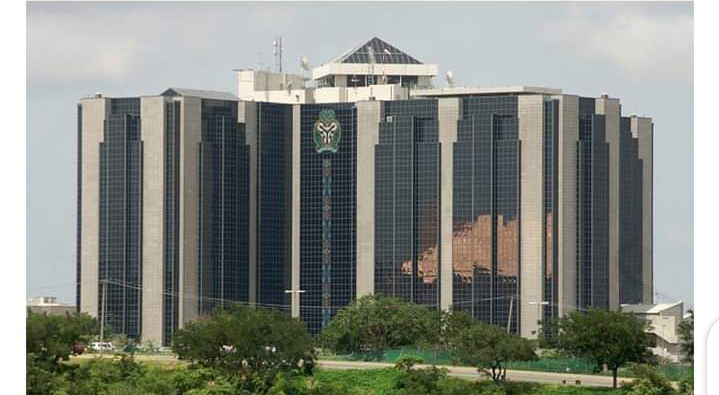

The Central Bank of Nigeria (CBN) has directed deposit money banks in the country to start charging 0.5% cybersecurity levy on some transactions done by their customers.
The apex bank gave the directive in a circular dated May 6, 2024 and sent to all commercial, merchant, non-interest and payment service banks as well as mobile money operators and payment service providers.
“Following the enactment of the Cybercrime (Prohibition, Prevention, etc) (amendment) Act 2024 and pursuant to the provision of Section 44 (2) (a) of the Act, ‘a levy of 0.5% (0.005) equivalent to a half percent of all electronic transactions value by the business specified in the Second Schedule of the Act’, is to be remitted to the National Cybersecurity Fund (NCF), which shall be administered by the Office of the National Security Adviser (ONSA),” the circular partly read.
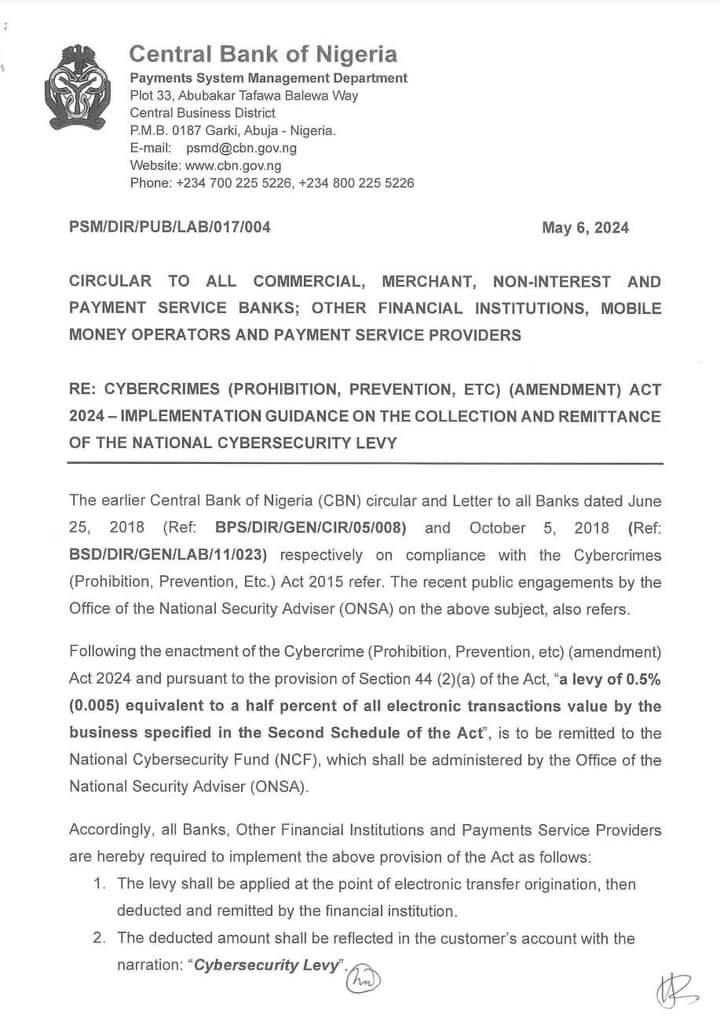

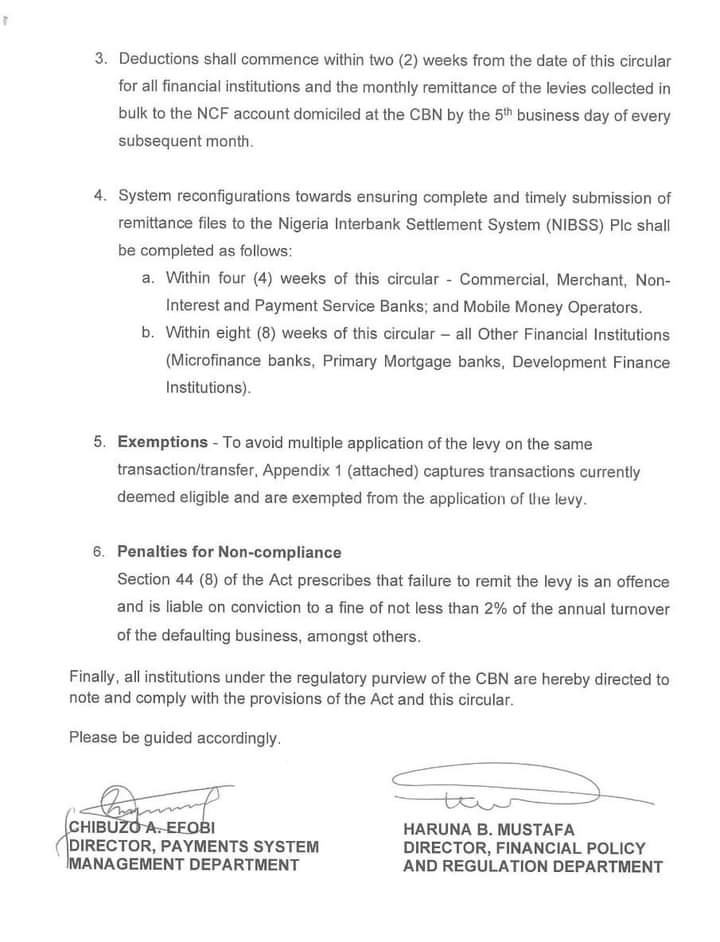

The apex bank said that the implementation of the levy would start two weeks from the date of the circular.
“The levy shall be applied at the point of electronic transfer origination, then deducted and remitted by the financial institution. The deducted amount shall be reflected in the customer’s account with the narration, ‘Cybersecurity Levy’. Deductions shall commence within two weeks from the date of this circular for all financial institutions and the monthly remittance of the levies collected in bulk to the NCF account domiciled at the CBN by the fifth business day of every subsequent month,” the circular said
The apex bank added that this new levy will not be applied on transactions such as loan disbursements and repayments, salary payments, intra-account transfers within the same bank or between different banks for the same customer, intra-bank transfers between customers of the same bank.
Also exempted from the levy were inter-branch transfers within a bank, cheque clearing and settlements, Letters of Credits, Banks’ recapitalisation-related funding only bulk funds movement from collection accounts, savings and deposits including transactions involving long-term investments, among others.
This current implementation however is not sitting well with some netizens as they reacted to the new development.
Here were some of their reactions from X.
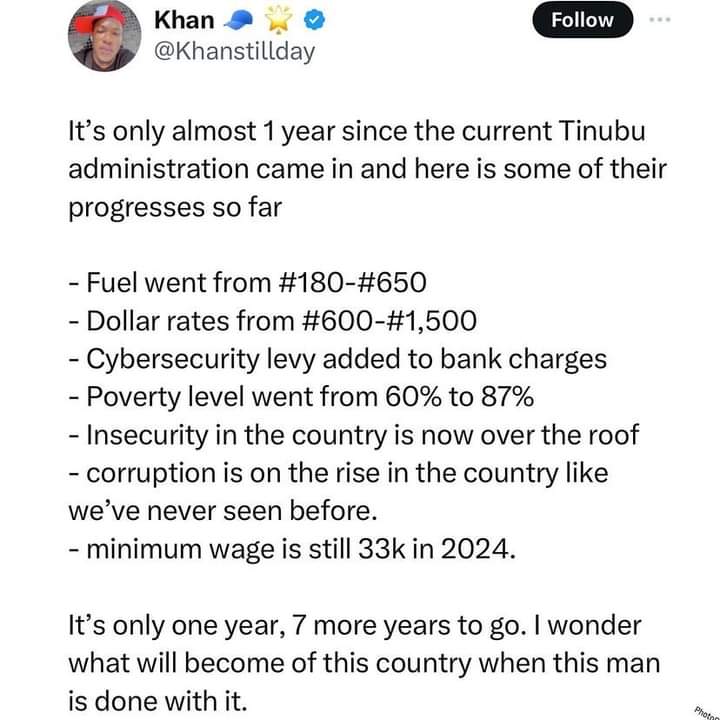

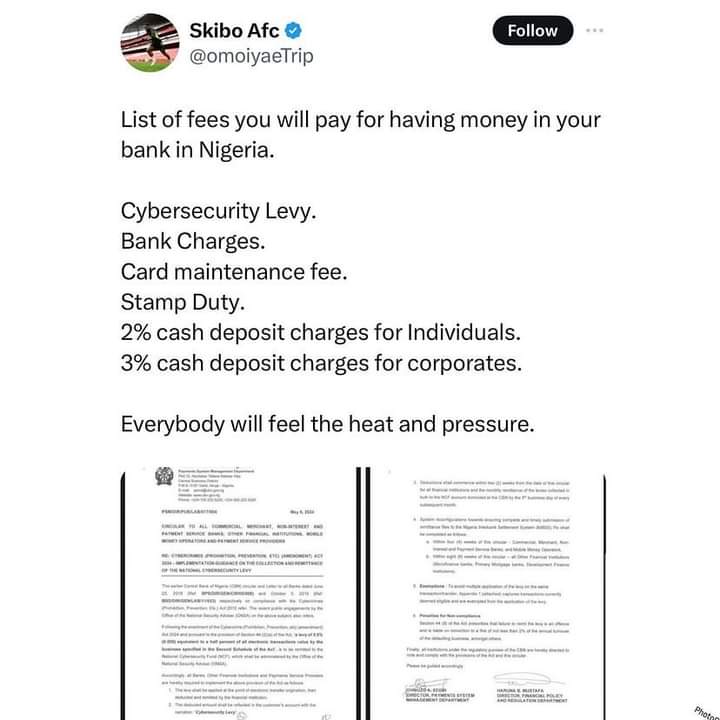



Finance
EFCC Chairman Tasks Nigerian Youths Against Crimes And Fraudulent Acts
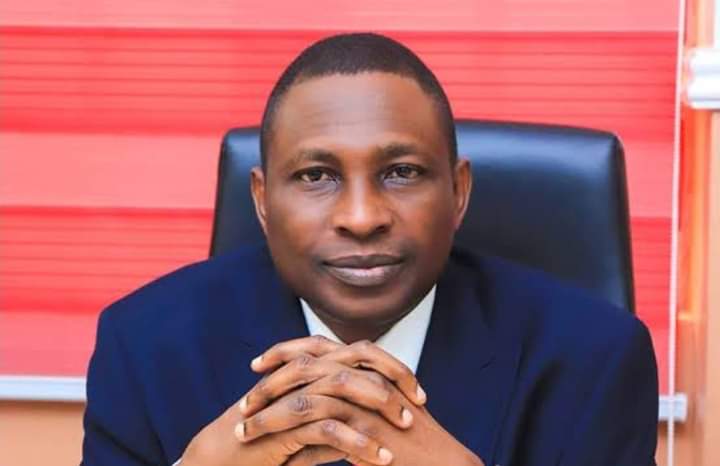

The Chairman of Economic Finance Crime Commission (EFCC), Ola Olukoyede, has stressed the need for Nigerian Youth to see themselves as agents of positive change that have a lot to contribute to the socioeconomic development of the Nation.
Speaking at the 2nd edition of a Leadership Trainings Programme in Abuja, Olukoyede, who was represented by the Head Enlightenment and Re-orientation unit, (EFCC), Aisha Mohammed, said the commission’s dream is to see the youth contribute meaningfully to the society, emphasizing on the need to work together in bringing positive change to society.
The Economic and Financial Crimes Commission Boss declared the readiness of his agency to work with all Stakeholders, including the youth towards changing the narrative and reposition the country to greater exploit.
Also speaking, the representative of the Executive Secretary of Tertiary Education Trust Fund (TETFUND), Sonny Echono, appealed to the youths is to eschew social vices that could deter their full potential in life.
Other speakers at the event, including the Chairperson, Zero Tolerance for Social Immoralities Initiative (ZEITI) Africa, Rasak Jeje called on all stakeholders to join hands in collective pursuit of empowering new generation of leaders to curb the rising tides of social Vice among Nigerian youths.
The Chairperson, Zero Tolerance for Social Immoralities Initiative (ZEITI) Africa, Rasak Jeje made the call while addressing journalists at the 2nd edition of it Leadership Trainings Programme in Abuja on Thursday.
He said the training was aimed to intimate students leaders with knowledge and insights that will help them drive positive change and become exemplary leaders in their respective spheres.
Finance
AISA Has Refunded The Fees Paid By Yahaya Bello To EFCC
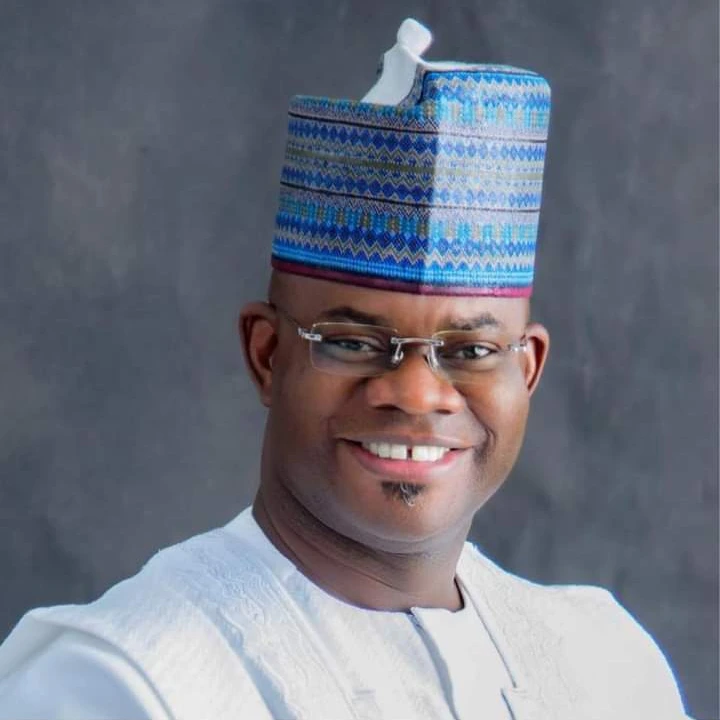

The Economic and Financial Crimes Commission (EFCC) says the American International School Abuja (AISA) has refunded the fees paid by the immediate past governor of Kogi state, Yahaya Bello, for his children attending the school.
In response to a letter addressed to the Lagos zonal commander of the EFCC, the school said $845,852 was paid in tuition “since the 7th of September 2021 to date”.
AISA said the sum to be refunded is $760,910 because it had deducted educational services already rendered.
“Please forward to us an official written request, with the authentic banking details of the EFCC, for the refund of the above-mentioned funds as previously indicated as part of your investigation into the alleged money laundering activities by the Bello family.
Since the 7th September 2021 to date, $845,852.84 (Eight Hundred and Forty-Five Thousand, Eight Hundred and Fifty Two US Dollars and eighty four cents) in tuition and other fees has been deposited into our Bank account.
We have calculated the net amount to be transferred and refunded to the State, after deducting the educational services rendered as $760,910.84. (Seven Hundred and Sixty Thousand, Nine Hundred and Ten US Dollars and Eighty Four cents).
No further additional fees are expected in respect of tuition as the students’ fees have now been settled until they graduate from ASIA.”
In a chat with The Cable, the spokesperson of the EFCC, Dele Oyewale, confirmed that the school has refunded the money.
‘’The money has been paid into public account,” Dele Oyewale was quoted as saying
-



 Politics4 days ago
Politics4 days agoPresident Tinubu Bans Purchase Of Petrol-dependent Vehicles By FEC Members
-



 News4 days ago
News4 days agoMath Teacher Accused Of Having Sex With 2 Students And Getting Pregnant For One Tearfully Reveals The Baby Was Taken Away From Her
-



 Entertainment2 days ago
Entertainment2 days agoWhy I’m Not Ready For Kids – Singer Burna Boy Reveals
-



 Entertainment3 days ago
Entertainment3 days agoMen Of The Lagos State Police Command Have Arrested Singer Portable
-



 News2 days ago
News2 days agoThe Peruvian Government Has Officially Classified Transgender, Nonbinary And Intersex People As “Mentally ill”
-



 GROpinion2 days ago
GROpinion2 days agoExposing the Malicious Sabotage of MoMo PSB Project in Enugu Ezike






